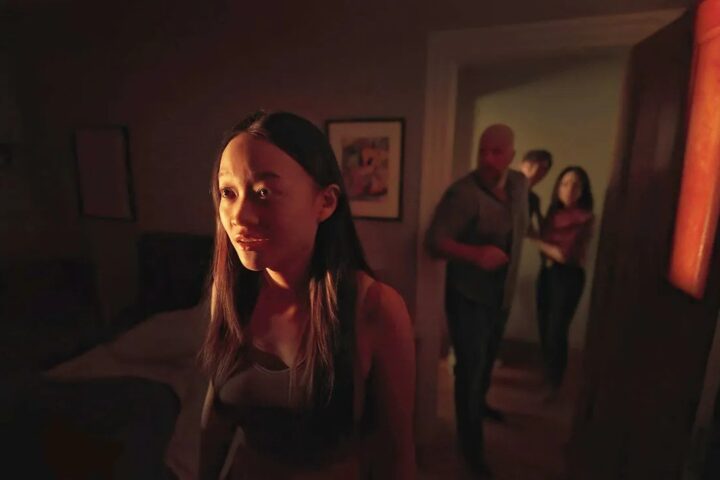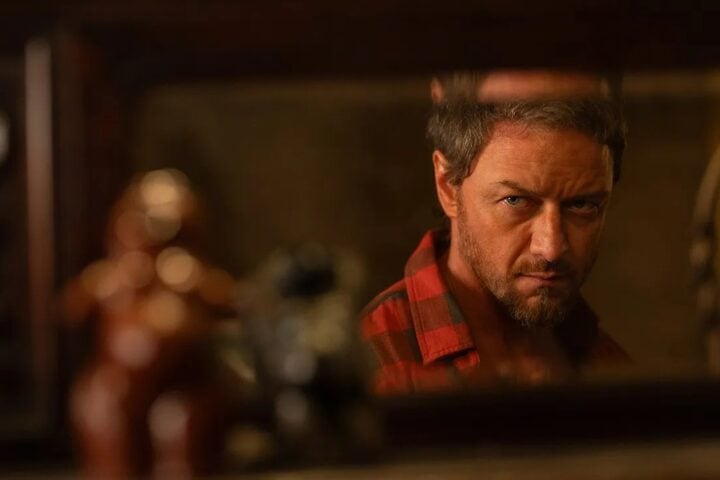Fans of Alain Guiraudie’s work may take the opening sequence of Misericordia as a sign that they’re in familiar terrain. A view from behind the windshield of a car winding its way through back roads to a small hillside village, it announces the premiere chronicler of lust and violence in the French countryside’s return to the milieu in which he made his name.
Indeed, Misericordia finds Guiraudie revisiting old standbys—a linking of queer desire and mortality, a distanced but lighthearted absurdism, and a refusal to get moralistic about transgressive behavior—under a relatively conventional set of aesthetic strategies. Fortunately, the ideas roiling under the former wildman’s newly placid surfaces are as potent as ever.
The driver in that opening sequence is Jérémie (Felix Kysyl), a baker returning to Saint-Martial, the provincial village of his youth, for the funeral of his mentor. Jérémie is put up by the baker’s widow, Martine (Catherine Frot), whose need for companionship in her grief suits his inclination toward an extended stay in the village. Martine’s loutish son, Vincent (Jean-Baptiste Durand), objects to the arrangement, jealous of his mother and suspicious of Jérémie’s motives. Their semi-retired farmer friend Walter (David Ayala) and the town’s mischievous priest (Jacques Develay) also figure prominently in the spare, chamber drama-like dramatis personae.
There’s an Oedipal edge to Vincent’s antipathy for Jérémie, who he believes has sexual designs on the vulnerable Martine. The true motives behind Jérémie’s soft, boyish visage remain obscure—including to himself—but it soon becomes clear that Vincent’s father was the true object of his affections. As is often the case in Guiraudie’s films, sexual desire in Misericordia is omnidirectional and unabashed, with little regard for traditional social boundaries.
The homoerotic tension in Jérémie and Vincent’s relationship carries over to Walter, who Jérémie awkwardly attempts to seduce, and the elderly priest, who harbors an infatuation of his own with Jérémie (one shudders to imagine age-gap relationship scolders stumbling onto Guiraudie’s cinema). Jérémie’s sexual misadventures go hand-in-hand with his symbolic return to childhood and reintegration into a family unit (we learn almost nothing about his actual family), bringing up some of the film’s most troubling Freudian material.
The competing passions at play throughout Misericordia inevitably spill over into violence, which Guiraudie shoots with the same matter-of-factness as the explicit sex scenes of 2013’s Stranger by the Lake and 2016’s Staying Vertical. But where an earlier work like 2003’s No Rest for the Brave, which similarly hinges on unspeakable acts and intergenerational romances, spins out from those acts in increasingly absurd directions, Misericordia tightens the screws on its central conflict with a distinctly Chabrolian single-mindedness and perversity.
Guiraudie is hardly the first French filmmaker to link the sex and death drives, but his perspective is distinguished by a resolute refusal to moralize about the former even when it leads to the latter. In Misericordia, that refusal of judgment becomes a subject of debate unto itself. For all the danger that comes with eroticism across Guiraudie’s work, there’s a recognition of its necessity and its liberatory power. At one point, the priest says that the town has “a great need for love,” later leaving little distinction between sexual and romantic affection. The filmmaker reserves his contempt for the police officers who enter Misericordia around the halfway point, bringing the modern police state with them as they barge into Jérémie’s bedroom in the dead of night, hoping to coax a half-conscious confession out of him.
That encroachment of modernity on a provincial way of life is key to the film’s unsettled feeling. Throughout, the village feels nearly empty except for our main characters, and Jérémie is advised against taking over for his mentor because people would sooner buy bread from the local supermarket. By contrast, much of the plot’s dirty business is done in the town’s outlying forest, a setting so busy with comings and goings that it takes on a theatrical air.
The area is popular with mushroom hunters, and one of Misericordia’s central visual metaphors becomes a cadre of coveted morels growing from a patch of soil above a dead body. As the priest says at the old baker’s funeral, love can continue even beyond death, and the image elegantly links nature’s cycles of death and rebirth with our own basest instincts.
While the film’s restrained quality relative to Guiraudie’s earlier work doesn’t necessarily make its ideas any less troubling or provocative, he’s also rarely played it safer in narrative and aesthetic terms than he does here. Misericordia doesn’t totally lack for inspired visual storytelling choices—Guiraudie can communicate a dramatic shift with as little as a decisive lens change for a close-up—but it doesn’t quite match the precise formal expressiveness of Chabrol’s pastoral thrillers in the same vein, such as 1970’s The Butcher and 1984’s Cop au Vin.
The balance between conventionality and subversion doesn’t always land, but perhaps that’s precisely the uncomfortable dynamic Guiraudie is exploring. The film’s French title translates to “mercy,” a quality bestowed on the characters even in their worst moments. In the wilderness of human desire, Guiraudie asks, who are we to judge by civilization’s rules?
Since 2001, we've brought you uncompromising, candid takes on the world of film, music, television, video games, theater, and more. Independently owned and operated publications like Slant have been hit hard in recent years, but we’re committed to keeping our content free and accessible—meaning no paywalls or fees.
If you like what we do, please consider subscribing to our Patreon or making a donation.



